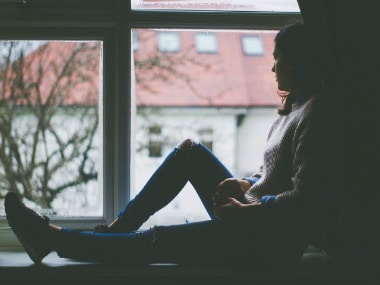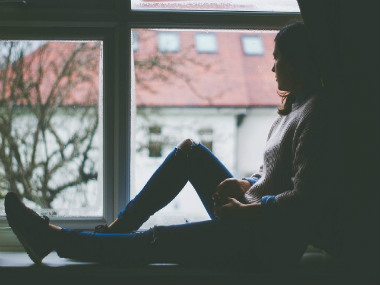If you were to picture loneliness, you’ll probably think of an aged person sitting alone on a park bench, missing bygone days and memories while staring into nothing. This old picture still holds some validity, but loneliness and social isolation have a new face now, and it’s that of a 20-something man or woman, standing in a crowd of people and yet feeling utterly alone. [caption id=“attachment_7793551” align=“alignleft” width=“380”]  Representational image. Image by Free-Photos from Pixabay.[/caption] It doesn’t always seem like millennials are socially isolated, does it? After all, we’re present on every social media and have followers from every corner of the world. And yet, the loneliness epidemic is now spreading largely among this age group. The anxieties that drive it are even expressed through widely used acronyms like FOMO (fear of missing out), MOMO (mystery of missing out) and FOJI (fear of joining in).
What is the loneliness epidemic?
You might think loneliness is a personal feeling or experience, and not an epidemic. But when a large section of the population reports feelings of loneliness and isolation which then lead to physical and mental health issues, it becomes a matter of public health and not just a private one. What’s even more alarming is the global scale of this epidemic which has been identified in spite of the lack of in-depth research in all affected regions. A study published in Aging & Mental Health in February 2019 revealed that young adults have reported double the number of lonely and isolated days compared to late middle-age adults. This is despite them having much larger networks. So you might be surrounded by a crowd of friends constantly in touch with you via social media or even a partner or spouse in real life - but if you still feel a crippling sense of isolation you could be suffering from the effects of the loneliness epidemic.
What causes this epidemic?
The current epidemic wasn’t born in a day or even a year but has been in the making for decades now. Urbanization and the opportunities it provided led to the breaking up of joint families and rural or semi-urban communities that ensured companionship. The nuclear family of the 1970s and 1980s gave way to the single-member households that are so common, even in Indian metropolitan cities today. If young adults living in cities to pursue a career choose to live with flatmates, they tend not to socialise overtly or form close bonds that can keep loneliness at bay. Even millennials living with parents or working in a crowded workspace can feel a sense of social isolation due to the generational gap they perceive and the lack of understanding they encounter from those around them. Also, with technology making it possible to stay constantly engaged online and have our needs met without compulsory human interaction, an awkwardness has crept into our modes of socialisation (that’s FOJI for you). Feeling a sense of isolation if you are living a modern urban life is quite possible and so are the many effects it can have in turn.
What can loneliness lead do?
That loneliness is emotionally painful and can lead to disorders like depression, anxiety, schizophrenia and delirium has been long established by scientists. It has also been linked to high risk of heart diseases and Alzheimer’s. A more recent discovery is the fact that perceived social isolation or loneliness can also lead to an increased risk of chronic illnesses and early death. A research conducted by the National Academy of Sciences of the USA revealed that the immune systems of lonely people work so differently that they have lower levels of antiviral agents called interferons. Their white blood cells are constantly active in such a way that it leads to chronic inflammation, hence the feeling that loneliness is physically painful. The study also found that the genetic structure of lonely people also changes over time, which can have far-reaching negative health effects too.
What can you do to prevent it?
We also live in times when everyone around us is in a race of popularity. The concept of loneliness, like many mental health issues, is actually looked down upon by many, which makes it harder to accept and talk about. But it’s a complex issue - feeling lonely from time to time is a part of being human and no one is immune. Understanding the problem, identifying those around you who might be at risk and lending a helping hand could make all of the difference. If you’re wondering what to do to prevent yourself or a loved one from getting affected by loneliness, here are a few things you can do:
- If you are feeling socially isolated, going into a shell isn’t going to help matters. Admitting something is wrong might be accompanied with a sense of shame or you might assume people will think less of you. But you need to fight this stigma attached to loneliness for your own benefit and reach out to loved ones.
- Don’t get tunnel vision and assume you have nobody left to communicate with. Man is a social animal and most people have a few human connections at least. Assess your contacts list, even acquaintances on social media, and find out who you can fix a regular meet-up with.
- Remember that you are not the only one feeling lonely. The fact that loneliness is an epidemic proves that. The obvious deduction from this is that there are others out there feeling exactly what you feel and they will be able to connect with you. You just need to reach out.
- Join a club or build a community of like-minded people. With social media at your fingertips, this isn’t very difficult to organise, but make sure you create a community that shares activities and feelings. Get creative about what you all can do together.
- Reach out to a mental health professional if you are unable to take the above-mentioned steps by yourself. Not only can this sort of a healthcare provider help you cope with and fight the darker thoughts that can plague you when you feel lonely, but also put you in touch with already-existing groups who share your feelings and social anxieties.
For more information, please read our article on Depression: Types, Stages and Symptoms_._ Health articles in Firstpost are written by myUpchar.com, India’s first and biggest resource for verified medical information. At myUpchar, researchers and journalists work with doctors to bring you information on all things health.


)

)
)
)
)
)
)
)
)



